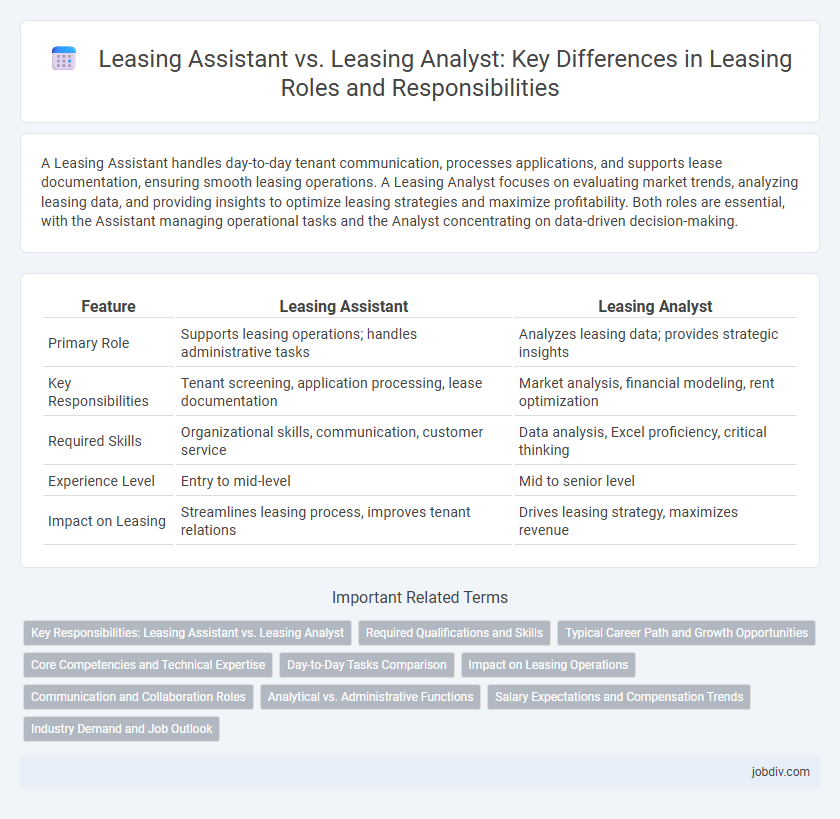A Leasing Assistant handles day-to-day tenant communication, processes applications, and supports lease documentation, ensuring smooth leasing operations. A Leasing Analyst focuses on evaluating market trends, analyzing leasing data, and providing insights to optimize leasing strategies and maximize profitability. Both roles are essential, with the Assistant managing operational tasks and the Analyst concentrating on data-driven decision-making.
Table of Comparison
| Feature | Leasing Assistant | Leasing Analyst |
|---|---|---|
| Primary Role | Supports leasing operations; handles administrative tasks | Analyzes leasing data; provides strategic insights |
| Key Responsibilities | Tenant screening, application processing, lease documentation | Market analysis, financial modeling, rent optimization |
| Required Skills | Organizational skills, communication, customer service | Data analysis, Excel proficiency, critical thinking |
| Experience Level | Entry to mid-level | Mid to senior level |
| Impact on Leasing | Streamlines leasing process, improves tenant relations | Drives leasing strategy, maximizes revenue |
Key Responsibilities: Leasing Assistant vs. Leasing Analyst
Leasing Assistants primarily handle administrative tasks such as processing lease applications, coordinating property showings, and maintaining leasing documentation to support tenant relations and occupancy goals. Leasing Analysts focus on evaluating leasing data, conducting market research, and preparing financial reports to optimize rental rates and identify leasing trends. Both roles contribute to efficient property management but differ in scope, with Leasing Assistants emphasizing tenant interaction and Leasing Analysts emphasizing data-driven decision-making.
Required Qualifications and Skills
Leasing Assistants typically require strong organizational and communication skills, proficiency in property management software, and a high school diploma or equivalent, with some roles preferring associates degrees. Leasing Analysts demand advanced analytical abilities, expertise in financial modeling, data interpretation, and a bachelor's degree in finance, real estate, or a related field. Both roles benefit from knowledge of leasing regulations, customer service experience, and proficiency in Microsoft Excel.
Typical Career Path and Growth Opportunities
Leasing Assistants typically start with administrative tasks such as managing lease agreements and tenant communications, gaining foundational knowledge of property leasing processes. Leasing Analysts advance by specializing in data analysis, financial reporting, and market research, enabling them to support strategic decision-making within real estate firms. Career growth for Leasing Analysts often leads to roles like Leasing Manager or Portfolio Analyst, leveraging advanced analytical skills and deeper industry expertise.
Core Competencies and Technical Expertise
Leasing Assistants excel in customer service, lease administration, and data entry, ensuring smooth tenant communication and accurate documentation. Leasing Analysts possess advanced skills in financial modeling, market analysis, and portfolio optimization to enhance leasing strategies and investment decisions. Both roles require proficiency in leasing software, but analysts demand stronger expertise in Excel, data analytics tools, and real estate financial metrics.
Day-to-Day Tasks Comparison
Leasing Assistants handle frontline customer interactions, process rental applications, manage lease documentation, and coordinate property showings to ensure smooth tenant onboarding. Leasing Analysts focus on data analysis, evaluating leasing trends, preparing financial reports, and assisting in market research to optimize leasing strategies. Both roles support property management teams but differ in operational tasks versus analytical responsibilities.
Impact on Leasing Operations
A Leasing Assistant streamlines day-to-day leasing operations by handling tenant inquiries, preparing lease documents, and coordinating property showings, which enhances tenant satisfaction and lease processing efficiency. A Leasing Analyst impacts leasing operations more strategically by analyzing market trends, lease performance metrics, and financial data to optimize lease pricing and improve portfolio profitability. Both roles are critical, with the Assistant ensuring operational smoothness and the Analyst driving data-driven decision-making to boost leasing outcomes.
Communication and Collaboration Roles
Leasing Assistants primarily handle direct communication with prospective tenants, coordinating appointments and providing essential property information to ensure a seamless leasing experience. Leasing Analysts focus on collaboration within the leasing team by analyzing market data and lease performance metrics to support strategic decision-making. Effective communication from Leasing Assistants complements the Leasing Analyst's detailed reporting, driving optimized tenant acquisition and retention strategies.
Analytical vs. Administrative Functions
Leasing Analysts focus on data-driven tasks such as market trend analysis, financial modeling, and lease performance evaluation to support strategic decision-making. Leasing Assistants handle administrative functions including tenant communication, lease documentation processing, and coordinating property showings to ensure operational efficiency. The Leasing Analyst role emphasizes analytical skills and interpreting complex data, while the Leasing Assistant role prioritizes organizational and administrative capabilities.
Salary Expectations and Compensation Trends
Leasing Assistants typically earn between $35,000 and $45,000 annually, reflecting entry-level responsibilities in property management support, while Leasing Analysts command higher salaries ranging from $55,000 to $75,000 due to their role in data analysis and market strategy. Compensation trends indicate growing demand for Leasing Analysts with strong analytical skills, driven by the need for data-driven decision-making in real estate. Salary growth for Leasing Analysts often outpaces Leasing Assistants as companies prioritize expertise in financial modeling and market forecasting.
Industry Demand and Job Outlook
Leasing Assistants are in growing demand for their role in handling administrative tasks and supporting property managers, with the industry expecting steady employment growth due to increased real estate developments. Leasing Analysts, skilled in financial modeling and market analysis, face a stronger job outlook as they provide critical insights that influence leasing strategies and investment decisions. Both positions reflect the increasing complexity of the leasing industry, but Leasing Analysts tend to command higher salaries and more specialized job opportunities.
Leasing Assistant vs Leasing Analyst Infographic

 jobdiv.com
jobdiv.com